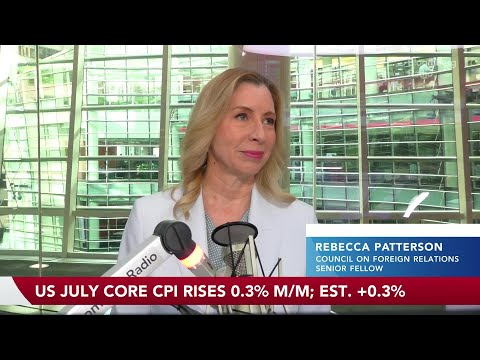Rebecca Patterson, Senior Fellow at the Council on Foreign Relations, discusses today’s CPI report, the new Bureau of Labor Statistics chief, and recent doubts in US data integrity.
Underlying US inflation accelerated in July by the most since the start of the year, though a tepid rise in the costs of goods tempered concerns about tariff-driven price pressures.
The core consumer price index, which excludes the often volatile food and energy categories, increased 0.3% from June, according to Bureau of Labor Statistics data out Tuesday. That was in line with economists’ forecasts, as was the overall CPI on a monthly basis.
Markets initially took the numbers in stride with Treasuries rallying and the S&P 500 opening higher, though they later pared some of those gains. Still, traders increasingly bet that the Federal Reserve will cut interest rates next month, especially given a softening labor market.
“Inflation was broadly in line with expectations as tariffs continue to be largely absorbed within profit margins,” James Knightley, chief international economist at ING, said in a note. “This gives the Fed the room to respond to the weaker jobs backdrop and cuts interest rates from September.”
The pickup in the core CPI was fueled by services prices. Excluding energy, they climbed the most since the start of the year. Airfares jumped by the most in three years, while medical care and recreation also advanced.
Goods prices, excluding food and energy commodities, rose at a tame pace. Some categories exposed to tariffs, such as toys, sporting goods and household furnishings and supplies, continued to increase, albeit at a slower pace than the prior month. Meantime, used car prices rebounded from a series of declines.
The reacceleration in services costs, after months of more subdued prints, underscores the lingering difficulties in taming inflation. Economists and policymakers have been largely concerned about goods prices given President Donald Trump’s sweeping tariffs, but consumer demand risks augmenting services inflation.
A sustained pickup in services prices would pose an additional challenge to Fed policymakers as they debate whether tariffs will lead to more enduring inflationary pressure in merchandise. Officials have left rates unchanged this year as they seek more conviction as to how tariffs will impact inflation — defying repeated calls from Trump to cut.
The president again called on Fed Chair Jerome Powell to lower borrowing costs after the report.
——–
More on Bloomberg Television and Markets
Like this video? Subscribe and turn on notifications so you don’t miss any videos from Bloomberg Markets & Finance: https://tinyurl.com/ysu5b8a9
Visit http://www.bloomberg.com for business news & analysis, up-to-the-minute market data, features, profiles and more.
Connect with Bloomberg Television on:
X: https://twitter.com/BloombergTV
Facebook: https://www.facebook.com/BloombergTelevision
Instagram: https://www.instagram.com/bloombergtv/
Connect with Bloomberg Business on:
X: https://twitter.com/business
Facebook: https://www.facebook.com/bloombergbusiness
Instagram: https://www.instagram.com/bloombergbusiness/
TikTok: https://www.tiktok.com/@bloombergbusiness?lang=en
Reddit: https://www.reddit.com/r/bloomberg/
LinkedIn: https://www.linkedin.com/company/bloomberg-news/
More from Bloomberg:
Bloomberg Radio: https://twitter.com/BloombergRadio
Bloomberg Surveillance: https://twitter.com/bsurveillance
Bloomberg Politics: https://twitter.com/bpolitics
Bloomberg Originals: https://twitter.com/bbgoriginals
Watch more on YouTube:
Bloomberg Technology: https://www.youtube.com/@BloombergTechnology
Bloomberg Originals: https://www.youtube.com/@business
Bloomberg Quicktake: https://www.youtube.com/@BloombergQuicktake
Bloomberg Espanol: https://www.youtube.com/@bloomberg_espanol
Bloomberg Podcasts: https://www.youtube.com/@BloombergPodcasts



